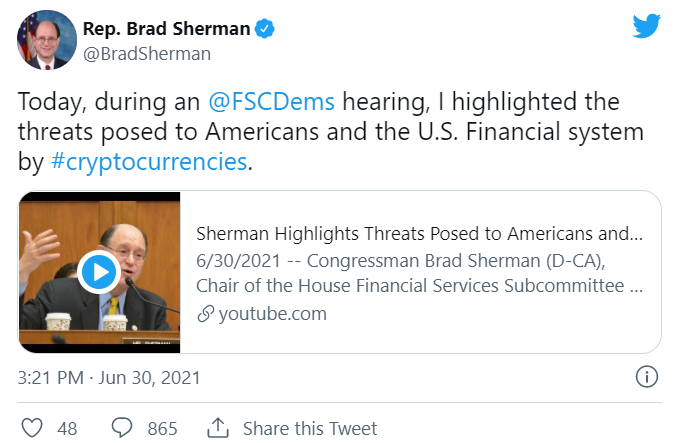News
Cryptocurrency Companies are Being Scrutinized and Banned by Regulators. Why is this Happening and Will it Continue?
Summary: Recently, cryptocurrency companies have been under fire from regulators around the world. For example, Binance has been banned by the United Kingdom and Malaysa, and BlockFi is banned in multiple U.S. states, and all exchanges are banned in China. This is due to the growing regulatory concerns around cryptocurrencies as well as lobbying by banks, ...
Recently, cryptocurrency companies have been under fire from regulators around the world. For example, Binance has been banned by the United Kingdom and Malaysa, and BlockFi is banned in multiple U.S. states, and all exchanges are banned in China. This is due to the growing regulatory concerns around cryptocurrencies as well as lobbying by banks, both of which should subside as cryptocurrencies become more mature.
Around the world, the main focus of media covering regulation seems to be on the regulation of cryptocurrencies. However, many fail to notice that cryptocurrency-related companies have also come under scrutiny from top world governments, and have been accused of selling unregistered securities, among other crimes. Without these companies, which bridge the gap between traditional finance and decentralized finance, investors around the world would have significant difficulty investing in the cryptocurrency market. Arguably, this makes the effective regulation of crypto businesses even more important than cryptocurrencies themselves.

Unfortunately, companies have been facing an increasingly uphill battle against regulators and banks. Countries have been banning the Binance exchange, citing regulatory concerns and the growing threat of money laundering and cyberattacks. Furthermore, in the United States, the cryptocurrency lending platform BlockFi has been banned from many states, including Kentucky, New York, Texas, and New Jersey.
Even though this trend is threatening, and does not bode well for the future of cryptocurrencies, both companies are fighting against their bans, and have ample proof to do so. The states that are banning BlockFi are giving the company, which is planning to go public in 2022, the chance to respond and prove that they are not selling unlicensed securities. In all likelihood, these bans are simply the effect of states who do not know how to regulate cryptocurrencies taking an overly-strict approach to start, before slowly rolling back their bans as they begin to understand more about blockchain technology.

BlockFi is ensuring their clients and investors that they are not breaking any securities laws and that they will continue to operate as normal. As a New York-based financial services company, BlockFi is subject to some of the most stringent regulations in the country, and should be easily able to meet the financial requirements of other states. Additionally, the fact that BlockFi is continuing to raise money in their Series E investment round is reassuring, as venture capital firms are betting that BlockFi is a legitimate company that will one day be listed as a public company on the U.S. stock exchange.
Banks around the world are somewhat responsible for putting pressure on regulators to take action against cryptocurrency companies. For example, Brad Sherman, one of the most anti-crypto politicians in the United States, receives $100,000 from banks and exchanges yearly, which suggests that he is acting in the banks’ best interests in order to continue receiving their donations.

In most cases, the companies on the wrong side of emerging technology either have to adapt or go out of business. Some banks have been adapting to crypto, like JP Morgan and Goldman Sachs, while others simply refuse to acknowledge it. The ones that refuse to accept that blockchain technology will bring changes to the financial system will be left behind, no matter how much they push for regulations on their competitors.
In all likelihood, the regulatory concerns with cryptocurrency companies will be sorted out within the next couple of years. Due to blockchain’s continued growth and maturity around the world, the United States will be pressured to be more lenient in regulations, to ensure that its citizens can continue being at the forefront of technology and a world leader in blockchain.
Though the recent push in regulations for cryptocurrency companies appears threatening to the cryptocurrency market, it will likely subside over the coming years. The cryptocurrency market is still a Wild West, and regulation must be made in order to bring blockchain and cryptocurrency to the masses. If regulation is strict and companies like BlockFi are barred from operating in the United States, it will be extremely negative for crypto. However, it is much more likely that banks begin to accept cryptocurrencies more, let off the pressure they are putting on Congress, and that effective regulation is created.
By Lincoln Murr
Tags: Binance,BlockFi,Cryptocurrency,Fund,Regulation,SEC
Link: Cryptocurrency Companies are Being Scrutinized and Banned by Regulators. Why is this Happening and Will it Continue? [Copy]